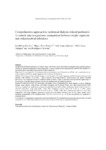Comprehensive approach to peritoneal dialysis-related peritonitis by enteric microorganisms: comparison between single organism and polymicrobial infections

Ver/
Use este enlace para citar
http://hdl.handle.net/2183/20405Coleccións
- Investigación (FCS) [1293]
Metadatos
Mostrar o rexistro completo do ítemTítulo
Comprehensive approach to peritoneal dialysis-related peritonitis by enteric microorganisms: comparison between single organism and polymicrobial infectionsAutor(es)
Data
2018Cita bibliográfica
Ribera-Sánchez R, Pérez-Fontán M, López-Iglesias A, García-Enríquez A, Rodríguez-Carmona A. Comprehensive approach to peritoneal dialysis-related peritonitis by enteric microorganisms: comparison between single organism and polymicrobial infections. Perit Dial Int. 2018; 38(2):139-146
Resumo
[Abstract]
Background: Peritoneal infections of enteric origin (EntP) have been classically investigated using partial strategies, focused on particular subgroups of microorganisms. A more comprehensive approach may facilitate the definition of the nomenclature and clinical presentation of these infections.
Objectives: To investigate the clinical presentation and outcomes of a full spectrum of EntP, with a particular interest in the comparison between single-organism and polymicrobial infections.
Method: Following an observational design, we investigated 165 single-organism and 83 polymicrobial peritonitis episodes with isolation of at least 1 enteric bacteria (Enterobacteriaceae, Enterococcus spp. and/or intestinal anaerobics). We compared the risk of treatment failure for these 2 types of infection and explored the significance of the isolation of specific microorganisms and of their antibacterial susceptibility patterns.
Results: Polymicrobial EntP was associated with higher rates of hospitalization, more changes to initial antibiotic therapy, more surgical explorations, and higher mortality and treatment failure rates than monobacterial EntP. However, stratified and multivariate analyses revealed that the burden of these differences rested on the isolation of intestinal anaerobics (odds ratio [OR] 12.05, 95% confidence interval [CI] 2.53–31.09, p < 0.001) and/or Enterococcus faecium (OR 3.37, 95% CI 1.02–11.30, p = 0.046), while other polymicrobial infections were more comparable with single-organism peritonitis, except for even higher mortality rates in the former group. Lower antibiotic susceptibility of the isolations (OR 1.18, 95% CI 0.51–2.70, p = 0.70) did not perform as a predictor of treatment failure.
Conclusion: A comprehensive approach to peritoneal infections by intestinal microorganisms may provide a focused perspective of the clinical presentation and outcomes of these complications of peritoneal dialysis.
Palabras chave
Peritoneal infection
Enterobacteriaceae
Anaerobic
Enterococcus
Mortality
Treatment failure
Enterobacteriaceae
Anaerobic
Enterococcus
Mortality
Treatment failure
Versión do editor
ISSN
0896-8608
1718-4304
1718-4304





